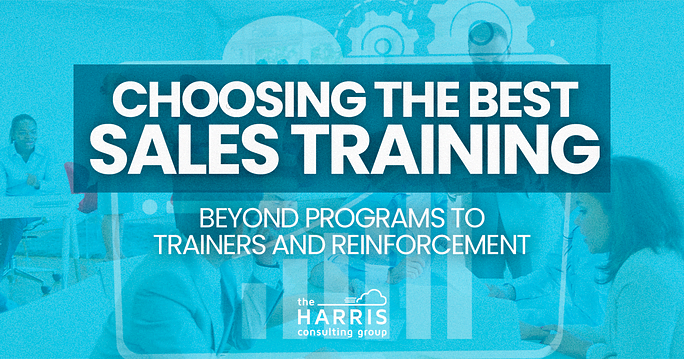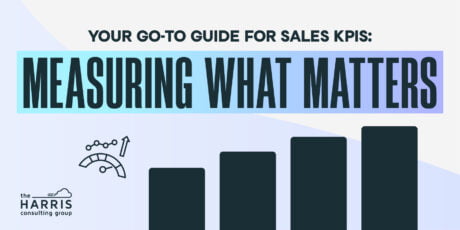Investing in a sales training program is a critical step for any business looking to enhance its sales team’s performance. And it goes way beyond simply choosing a trainer you know, like, or who has been referred to you.
It’s essential to recognize that the success of a sales training initiative isn’t solely determined by the program itself. Or just the sales trainer, or the delivery method.
These things definitely matter, and it’s important to remember, they matter in collaboration with each other, not a single silo. Considering the trainer, their engagement with your team, and the reinforcement strategies implemented, you can offer your team the best training possible.
The Lazy Way to Choose a Sales Trainer
Don’t let Lazy Larry make the decision simply because he’s worked with someone before. Just because a certain trainer or training organization is a known entity is not the reason to use them as a sales trainer.
This comes down to the definition of “known”. More often than not the “known” simply means they have used them before and don’t remember how sticky the program was. In some cases, they don’t even remember what the previous sales team thought of the training.
Essentially some leader in your organization is simply being lazy with the “nobody ever got fired for buying IBM” mindset. Which is actually not true. If you have not asked them what they would do differently this time, then your sales leadership is being lazy. They do not care about the sales team, and simply want to check “sales training” off the to do list.
So, the priority is to simply ask yourself the following:
At the end of the sales training we want the sales team to be better at ___, ___, and ___.
Fill in the blanks with use cases, not buzzwords. This means, “prospecting via email, cold, call and LinkedIn”, not simply, “Prospecting”. This means, “closing the deal with the procurement department”, not just “closing”.
Now, once you have these few examples go to all your potential trainers, and ask them to prove to you how they will help train your team. This will help you short-list your potential sales trainers.
The trainer plays a pivotal role in shaping the learning experience for your sales team. Moreover, it’s not just about trainers’ knowledge of sales techniques but also about their ability to connect with the participants.
Sales Training and The Grumpy Gus – Connection with Participants:
On every sales team there is always a Grumpy Gus or Negative Nancy. Gus and Nancy are the sales people who sit in the back of the room, arms folded, thinks they know it all. They believe that they have been to so many sales trainings that this one will be a waste of their time.
Finally, when it’s all done, they will simply do what they want, and how they want. So, do not choose a sales trainer without having your sales team engage with the trainer BEFORE signing a contract. If you do so, you will just make the biggest career mistake of your life.
Everytime we bring this up, our prospects smile and say, “Yup, I know who that is on our sales team.” An effective and best in class sales trainer will want to speak to the Guses and Nancy’s BEFORE the contract is signed.
They will understand how to acknowledge, respect, and leverage G&N’s experiences to bring them into the tent without patronizing them. The positive effect of this is that G&N will feel seen, heard, and respected by your organization because their opinion matters. Which in fact it does.
Remember, G&N are going to help your sales trainer understand the culture and needs of the team as a whole. Which then makes customizing the training all that easier.
The trainer’s ability to establish a connection with your team is paramount. Effective communication, relatability, and a genuine understanding of your team’s challenges contribute to a positive learning environment.
Sales Training’s Preparation and Presence:
Assess how trainers prepare for sessions and their overall presence during training. How much time will they spend listening to your sales calls and making sure the right role plays are going to be used?
If the sales trainer does not say, “Just flood my inbox” with anything you have to help me know your world, then we suggest you find another sales trainer. People think this is a standard thing all sales trainers do. However, we can assure you only the best in class sales trainers and sales training programs actually do it.
A well-prepared trainer demonstrates commitment and professionalism, contributing to a more impactful learning experience.
Engagement Strategies for your Sales Training:
The brain will only absorb as much as the butt will tolerate. This means sales training cannot be some long boring, death by powerpoint exercise. Best sales trainers and sales training programs incorporate visual, auditory, and kinesthetic activities to keep the audience engaged.
Here are a few things to consider:
Creating a Safe Space
A great sales trainer will encourage the team to disagree with something the trainer says. Moreover, she/he will be able to explain how to do this so the team can feel comfortable.
Too often people will not disagree with a person leading the conversation because they are supposed to be an expert. Newsflash, all sales trainers are experts at lots of things, they are not experts at everything.
Thus, I am willing to say this in front of the team and I reward them for calling me out when they disagree. It’s not about who is right or wrong, it’s about what is the best way for someone on your sales team to use a specific tactic or strategy in your sales conversations.
I love it when people disagree with me and their opinion is the better way to do something. I don’t know it all, and I don’t have the need to know it all. All I want is for your team to be successful and happy.
Simply ask the sales trainer – “How do you encourage the team you are training to disagree with you?”
Sales Training’s Customization
This is critical for all sales training and this is accomplished by having strong real playing and role playing exercises. Real playing simple means discussing a specific sales training strategy or tactic and discussing where the sales rep has experienced this.
Role playing is about taking the strategy or tactic and based on an upcoming sales meeting role playing that tactic or strategy. In the event there is not an upcoming meeting your sales trainer should work with you to create a role play.
For example, we offer a “Negotiating with Procurement” module. This does not happen frequently enough, sadly, that there may be a meeting already scheduled on the calendar.
Simply ask the sales trainer – “What examples of role playing have you done in the past to make sure the topics being covered are connecting the dots for the sales team?”
Eliminating Distractions During Sales Training
Laptops closed!
A great sales trainer will require all cell phones and laptops to be off and/ or closed during the training (granted, virtual requires laptops opened). We’ve been known to give away cash to anyone who turns off their cell phone, or sets it in the front of the room if it’s live and onsite.
Yes, someone can cheat if it’s virtual training and turn the phone back on, that’s fine, karma will catch up with them. Usually in their pipeline. Simply ask the sales trainer – “How do you make sure the team eliminates distractions during your sales training?”
Walk Away Materials
When choosing a sales trainer if there is not a workbook to go along with the training for each rep, then move onto the next trainer. It’s so simple to do this, and yet so few ever do.
Ask your sales trainer – “So is there a physical or tangible takeaway each rep gets from the training?”
REINFORCEMENT – A MUST HAVE FOR SALES TRAINING
If the sales training program does not include reinforcement as part of the sales training offer then they are not a best in class sales training organization. At minimum the reinforcement to the sales training program should be weekly for 2-3 weeks after the initial training.
The best of the best in class sales trainers include management reinforcement and sales team reinforcement sessions. And they should not cost extra. Simply ask your sales trainer – “What type of reinforcement sales training exercises exist with your program?”
Trainer Selection Process
If you are not speaking with the actual sales trainer who will be training your team from day one, this is a big red flag when choosing a sales trainer or sales training organization.
Anyone asking you to go through some qualification and discovery as part of the process before you speak with the sales trainer is simply far too arrogant in our opinion. This is important, but it’s rocket surgery or brain science.
You are welcome to share this post along with the hashtag #BlameRichard and say, “Richard says we are being stupid (and lazy per above) if we don’t consider all of this.”
Conclusion
Selecting the best sales training program involves looking beyond the curriculum. The trainer’s ability to connect, engage, and prepare, along with ongoing reinforcement strategies, are critical factors that contribute to the long-term success of the initiative.
By considering these aspects, businesses can make informed decisions that not only improve their sales team’s performance but also create a lasting impact on the organization’s overall sales culture.
At The Harris Consulting Group, we understand the importance of sales training and the key role that trainers play in the process. That’s why we provide tailored sales training and the best trainers focused on each company’s needs.
Do you want to boost your sales team with our programs? Let’s contact us and take your company to the next level of sales.
And remember, don’t be Lazy Larry, Grumpy Gus, or Negative Nancy.






